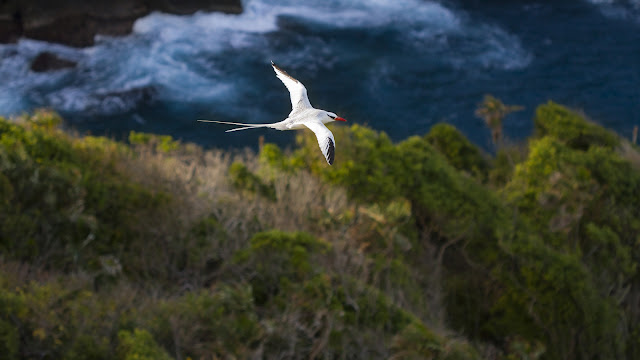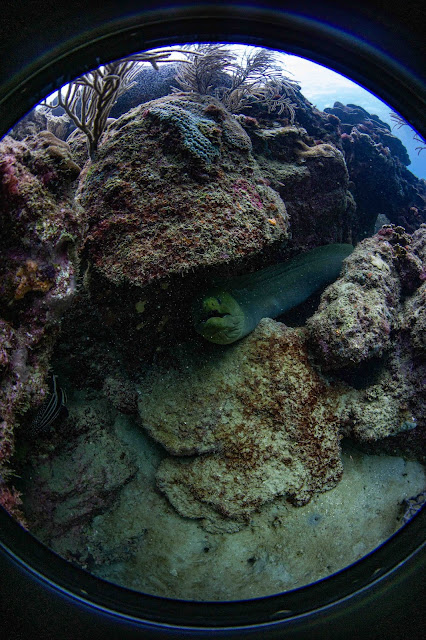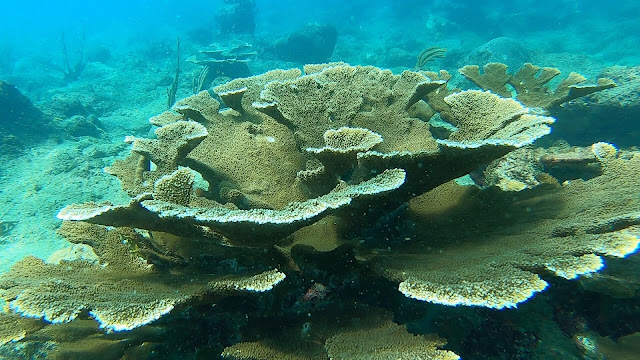Tourism and Underwater Tobago
Derek Chung, owner-operator of Undersea Tobago, chats with Pat Ganase about tourism and the marine environment of Tobago. Photos courtesy Derek Chung
Over 37 years diving in Tobago, Derek Chung has explored the island’s offshore domain in more than 14,000 dives. His recent projects include locating and identifying shipwrecks off the coast. He has made a life bringing visitors to the underwater world. Today he is concerned about how fast the reefs are deteriorating due to global warming, water pollution, indiscriminate spearfishing and poorly planned coastal development, which threaten his livelihood, food security for Tobagonians and Tobago’s tourism.
“I was a loans officer at a commercial bank in Trinidad when I learned to scuba dive, loved it and became certified as an instructor in 1987, the same year I came to Tobago to open a diving center. Following (then Prime Minister) ANR Robinson who was pushing tourism, I came to pursue a passion, a young man with no assets or encumbrances.
“Initially, my business partner and I operated from a beach chair on Mt Irvine Beach growing rapidly to have operations at Crown Point Beach Hotel, Grafton Beach Resort and Blue Waters Inn. However, I eventually left after 10 years, to start Undersea Tobago with my wife Evelyn, who also then became a diving instructor. In 2000, we became the PADI Dive Facility at the Coco Reef Resort and still are.
“Business took off in the 1990s and continued to grow until 2006. By 1999, there were 12 or 13 dive centres – store front operations – plus others offering dive services. In 2004-5, after Grenada was devastated by Hurricane Ivan, their market shifted to Tobago. We were in the same vicinity for air transport, had similar pricing structures, offered similar experiences. Our uptick in tourism in Tobago after 2004 came from their misfortune. Grenada worked hard and steadily to regain and maintain their tourism sector. In 2019, Grenada had 136,000 visitors in the month of January.”

Derek
Chung is a Master Scuba Diver Trainer
Chung attributes the downturn in Tobago tourism since 2008, to what he calls a perfect storm: the global financial crisis; negative publicity from an attack on foreign nationals; and repeal of the Alien Landholding Act replaced by the requirement of a special licence for foreigners to own land in Tobago. While other Caribbean destinations were seeing steady increases in visitor arrivals, Tobago has continued to decline since then.
“Business – like most of life - is cyclical so after the initial fall in 2008, I thought if we could hang on for four or five years, things would rebound. The decline continues. This is probably why, today, our international visitors are delighted to find they have the beach, the forest, the ocean to themselves. They love this seemingly pristine uncluttered experience. It’s not sustainable for us. We don’t want mass tourism, but there must be an optimum sustainable level.”
 |
| Octopus, Mt Irvine |
 |
| Sea horse, Mt Irvine |
 |
| Diving with the manta ray |
RE-BUILDING THE TOURISM SECTOR
There is always talk from every administration of the need to diversify, says Chung. “With the exception of ANR, no meaningful measures have been enacted. A new airport is nice but will not attract airlines and visitors on its own. To increase international visitors, we need to have sufficient room stock at an international standard, with customer service and providers in land and sea niches to support an industry. A combined, simultaneous effort is required on all fronts to achieve growth in tourism, and the critical mass to sustain it. Customs and Immigration must be sensitive, fast and friendly. The public must be educated, to be aware that international visitors are our guests.”
He remembers, “In 2000, you wanted a rainforest tour, what was your preference, hiking, biking, birding, ATV? You could have a coastal tour, in a choice of boat; a helicopter tour. You could have a day trip to Venezuela to see Angel Falls. Visitors had services, tours, restaurants to choose from. We were there before, we can do it again.”
He adds for emphasis, “In the late 1990s to 2006, you would see the ordinary Tobagonian pulling out US$ to pay for groceries. Who knows how much US cash was circulating in Tobago then? Tourism is a foreign exchange earner and everyone was benefitting.”
Here are some of his suggestions to attract investments to our island:
· Revisit the Alien Landholding Act;
· Revisit Tourism incentives, tax holidays, incentives.
“We are far down the list of Caribbean destinations for the international investor who wants a healthy return on his investment.
“On top of that, we are a society preoccupied with short-term fixes, exacerbated by governments running our country in four or five year cycles. Do we have to go belly up to realise meaningful change cannot take place in these short timeframes?” he wonders.
Of course money is a major incentive, he believes. “If young people do not see tourism as a worthwhile career, they will find other ways of earning a living.”
There is no free money. But he has proven that passion and performance go a long way, “I do not have a university degree. Even without formal education, with the right attitude and personality, you could make a decent living in tourism. Learn to identify birds. Learn about the rainforest. Learn to dive. Learn about our marine environment.”
He adds, “When somebody is travelling to Tobago, they are expecting to have a fantastic time. Visitors are predisposed to enjoy, to explore, to have a good time. Half the job is done. We just have to hold our end, service at a high standard. It’s easy peasy to become a foreign exchange earner.”

Bleached
mountainous star coral at Castara Reef. Photo by Anjani Ganase 
Bleached
corals on Angel Reef, Goat Island. Photo by Anjani Ganase
LOSS OF ICONIC CORALS
The bleaching event which affected most reefs in Tobago in the middle of November shocked Chung. “It is heart-breaking. Overnight, it can disappear. And now, we stand to lose the fish diversity, the spawning grounds, the protection of the shoreline. There’s less to show from the glass-bottomed boat; less to show my diving visitors. The death of corals will affect everyone. The current bleaching event is happening throughout the Caribbean, but it needs concerted effort by the whole world. There is no short-term remedy. We can’t change the ocean temperatures. We can only hope for colder water in January.”
While corals are stressed, in this vulnerable state, he suggests that these are things we can do:
· Improve the quality of the water by taking care of pollution running off the land.
· Update the fisheries laws (which are ancient); there is unregulated fishing of parrot and angelfish. Monitor and enforce.
· Manage, protect and enforce regulations in marine parks.
He’s trying to be optimistic about his business, “If I had a diving customer from say 20-30 years ago, and he came back today – there’s noticeably less coral – he would be disappointed and probably never return to Tobago. If I take someone diving for the first time next year, the new normal is less coral. I don’t know… I might still be in business.”
NATURAL HISTORY AND HERITAGE
“As an island nation, we are largely ignorant of our maritime history. We have done little to gain knowledge, to explore or protect our heritage where the ocean is concerned. Out of sight out of mind. There is so much unrecorded history around the island. I would like to see it explored and developed.”
Chung is the Underwater Cultural Heritage representative for the Tobago Museum Trust since 2012; and participated in UNESCO programmes for safeguarding underwater cultural heritage.
Locating and identifying Tobago's shipwrecks is a personal project. Apart from the wrecks in Scarborough, he has located seven others, including the Gran Rio R which disappeared without trace in April 2000, with nine crew onboard. “We were able to bring closure to the crew's families in March 2022. Next is a Polish merchant ship torpedoed in 1942.”
He has a caretaker’s approach to operating his business, “We have a strictly hands off policy at Undersea Tobago. You take nothing – no parrotfish, no lobster, no bit of coral (except lionfish because it is invasive.)” As a Master Scuba Diver Trainer, he introduced scuba experiences for children 5- 7 years. He insists on proper dive techniques, for no impact on the reef. He talks quickly and plenty, but he is all about sharing knowledge and ensuring that the underwater world is appreciated.

Derek
Chung with an earthen jar, artifact from a shipwreck.


